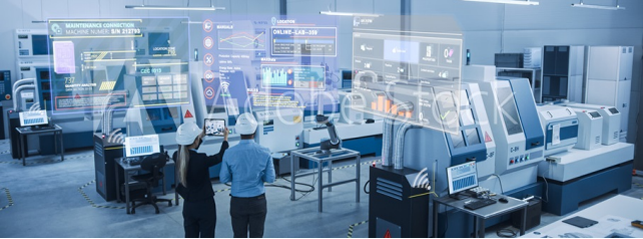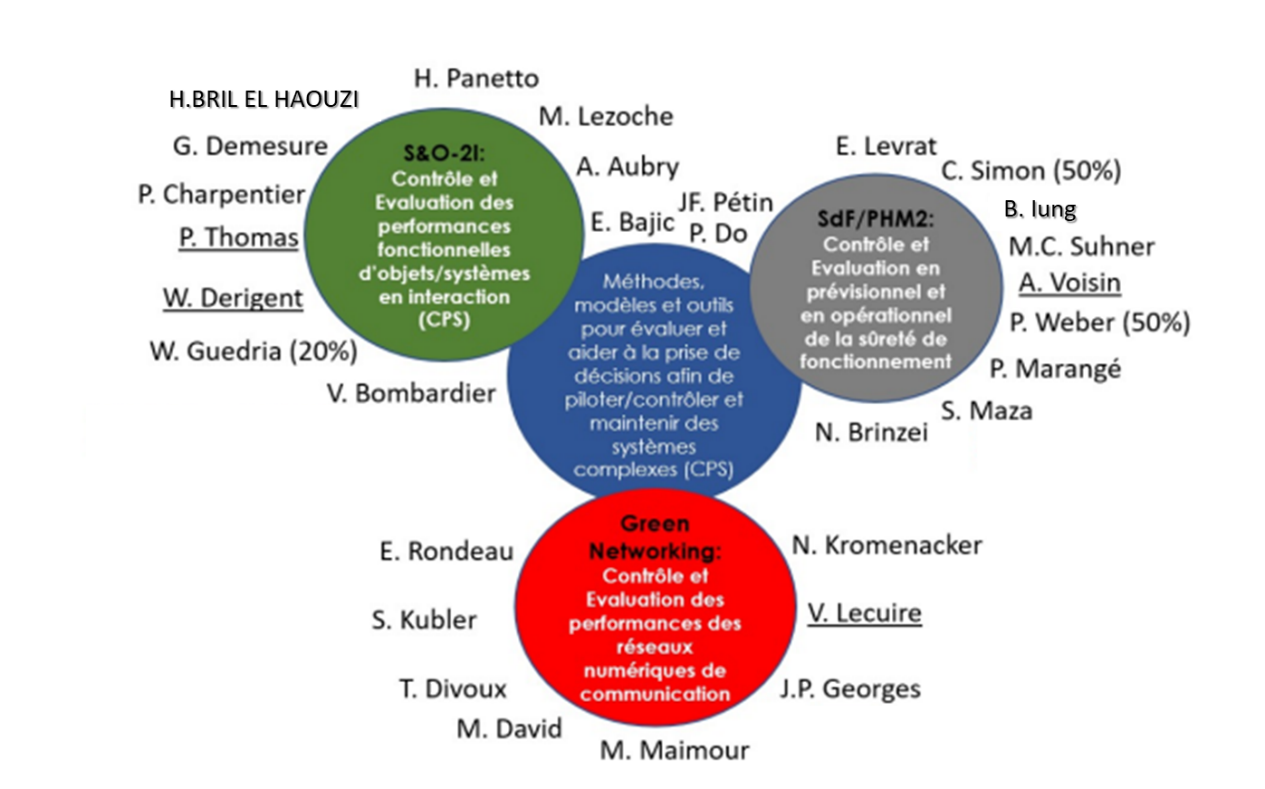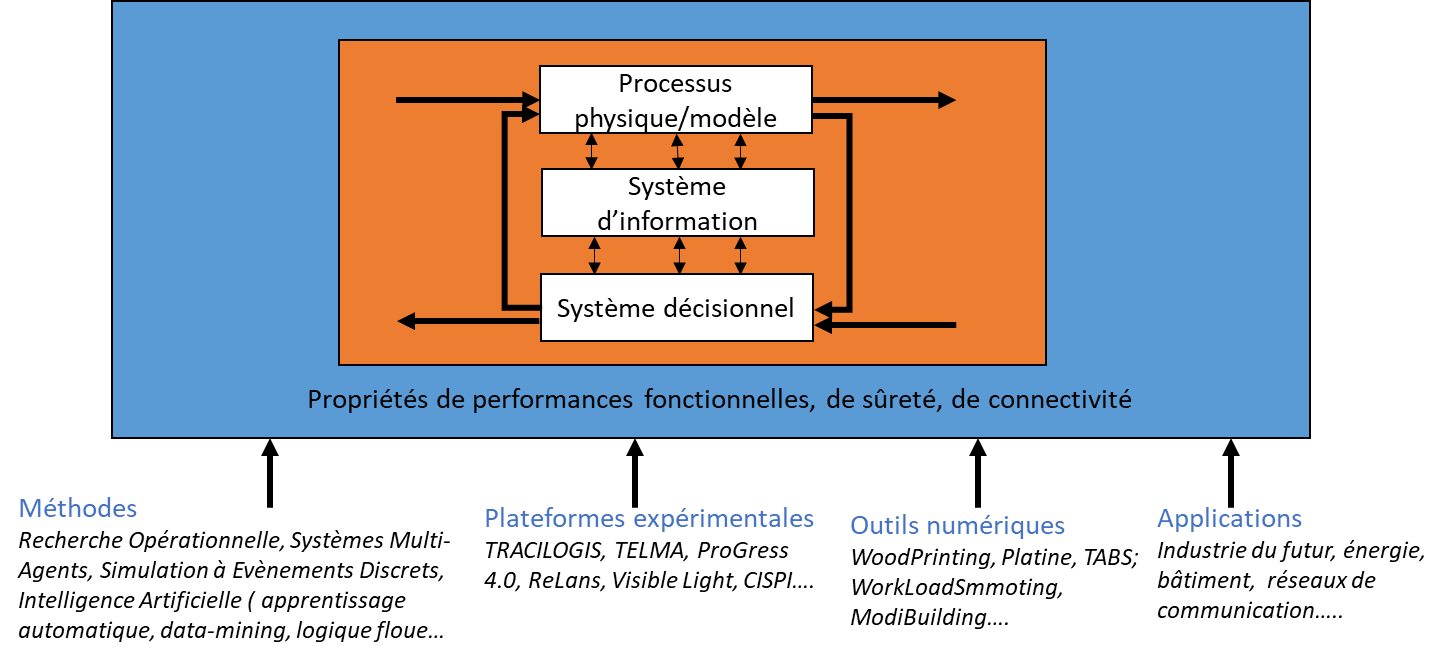
The MPSI department (Eco-Technical Systems Engineering) aims to contribute to the modeling and evaluation of complex eco-technical systems. This notion of system is to be understood here as a sustainable research object (eco-technical) integrating digital technologies (towards Cyber-Physical Systems - CPS), but also as a methodology (system engineering) advocating an integrative vision of the issues related to it. The systems of interest studied in this department are mostly Dynamic and Complex Event Discrete Systems positioning the department in the disciplinary field of Automation and Computer Engineering. In this sense, the research work, both fundamental and final, carried out within the department focuses more specifically on the development of methods, models and tools associated with the evaluation and decision-making processes in order to pilot/control and maintain in operational condition the targeted CPS-type systems. This purpose of piloting/controlling/maintaining is more specifically declined in view of the functional performances to be satisfied by the system (control of physical flows in coherence with informational flows), but also of its safety and connectivity requirements (communication between the autonomous components of the system).
Thus, in coherence with the keywords of section 61 (Computer Engineering, Automation and Signal Processing) of the CNU, the department develops 3 disciplinary orientations: modeling and control of industrial cyber-physical systems, Automation of communication networks, and Safety of complex systems.
These disciplinary orientations are attacked within three projects structuring the department scientifically. The members of the projects carry out both disciplinary refueling work to maintain scientific credibility in relation to the communities of their positioning (e.g. GdR MACS, SAGIP, IFAC, IEEE, PHM society), but also by initiating more transversal work to tackle other department-level "system" issues, i.e. emerging from the interaction between projects.
— The project "Intelligent Systems and Objects in Interactions" (S&O-2I) with William DERIGENT and Philippe THOMAS as animators.
This project, centered disciplinarily around the modeling and control of cyber-physical systems, aims to model and control CPS (logistics, production, services) built on the interaction of multiple objects, of heterogeneous natures, endowed with autonomy and self-organization capabilities, with a view to improving the economic and environmental performance of these systems as well as their social acceptance.
— The "Green Networking" (GN) project with Vincent LECUIRE as animator.
This project, centered disciplinarily around the Automation of Networks, aims to study, model and evaluate communication networks in order to better control their properties in relation to their environmental integration.
— The "Safety of operation, PHM and maintenance" (SdF-PHM2) project with Alexandre VOISIN as animator.
This project, centered disciplinarily on the safety of operation of systems, aims to evaluate performance and optimize the safety of operation in order to best ensure the ability of a system to tolerate hazards.

Figure 1: The structuring of the department around three scientific projects
Like the scientific framework proposed in the new GdR MACS by D. PEAUCELLE and returning to fairly simple systemic concepts, the scientific field of MPSI is part of the design of decision-making systems that fall within the informational processes placed in interaction with processes that have a physical reality.

Figure 2: Presentation of the department's research
As shown in Figure 2, our subject of study is the analysis of the properties (functional, safety, connectivity) of the coupling between the physical process and the decision system, as well as the synthesis of the decision system that improves these properties. Our scientific contributions lie in the development of methods, often associated with digital tools, and in interaction with applications. Thus, more specifically, this decision-making vision is perceived through the 3 declinations (constituting as many challenges) of the different performances/requirements of the systems addressed in MPSI:
— The piloting/control and evaluation of the functional performances (why the system was created) of objects/systems in interactions (CPS) for the operational management of these systems (S&O-2I project - Systems and Objects in Interactions)
— The control and evaluation of the performances and environmental footprint of digital communication networks that ensure the connectivity of these systems (GN project - Green Networking)
— The control in forecasting and operational of the safety of operation of these systems by evaluating FMDS (Reliability, Maintainability, Availability, Security) performances and decision-making in maintenance (performances that must be ensured on essential properties of the system so that it remains in its operational operating space in order to ensure its functional performances) (SdF-PHM2 project, Safety of operation, PHM and maintenance)
Compared to the 3 disciplinary orientations defended (modeling and control of cyber-physical systems, Automation of communication networks, and safety of operation of complex systems) the department positions itself in originality and/or complementarity (e.g. joint projects) to research carried out in laboratories with a close scientific spectrum which are at the national level mainly the LISSI, LAAS, IRIT, GIPSA, UTT-ICD, FEMTO, LSIS, LAMIH, G-SCOP, LS2N, DISP, LIB and LGP-ENIT laboratories, and at the international level Cranfield University, Politecnico Di Milano, Luleå University, Leeds Beckett University and NIST. Compared to these laboratories/Universities, these originalities/complementarities are claimed:
— Relative to the study of CPS (modeling, piloting) and to a consideration of new forms of interactions and the knowledge related to them. These forms are more specifically declined by the consideration of so-called "social" interactions between objects (notion of consensus) collaborating with the human being himself interfering with the system (notion of explicability; advanced digital twin), the proposal of aggregation mechanisms, the formalization based on AI tools of knowledge representative of a semantic interoperability between objects and the real behavior of the system, and by the study in these interactions of resilience to disturbances.
— Relative to the development of learning methods and the design/validation of architectures/protocols for the optimization of networks. These methods allow, on the one hand, to complement the analysis of service/experience quality with environmental integration metrics and more singularly biomimetic approaches, and on the other hand, to focus on robustness properties (facing new technologies such as blockchain) and a network observability concept.
— Relative to a holistic and system vision (and not just component) of the safety of operation. This vision is declined both in forecasting (integrated vision of Reliability/Maintainability/Availability/Security - FMDS properties) and in operational (integrated vision of Prognostics and Health Management - PHM processes and interactions between system elements) also leading to explore new concepts such as industrial regeneration or remaining life in energy efficiency.
The management and animation of the MPSI department have been significantly reconsidered since 2018. These reconsiderations stem from a collective work mainly carried out by the HDR members of MPSI. This has led to a new organization of the department built to allow better involvement of project managers and young lecturers (HDR).
It is therefore based on 5 pillars that constitute the reference framework for the various animation actions:
— Maintain, or even increase, the quality of scientific production while reducing the dispersion of media used.
— Maintain, or even increase, the influence of the department members as well as our academic attractiveness.
— Maintain, or even increase, interactions with the economic, social and cultural environment.
— Maintain good "living together" conditions for the department through continuous improvement of the management and animation system (current strong point of the department).
— Encourage the involvement of department members in research training.
From a more organizational point of view, the animation and administration of research activities at the MPSI department level are based on:
A scientific management carried out both by the co-managers of the department and by the office (decision-making and collective management body) so that the chosen orientations are approved by all, while ensuring consistency at the department level. Upstream, the department managers have the main role of ensuring that the MPSI actions taken at this level are consistent with the laboratory policy, a policy discussed and developed among others during the management team meetings in which the MPSI animators participate.
Consequently, the office has a central role in the animation of MPSI since it must make consensual decisions consistent with the laboratory objectives and the scientific policy of the MPSI department (e.g. allocation of doctoral contracts, allocation of master scholarships...) by ensuring a relay role with all members so that the decisions taken are well understood.
Decisions can concern scientific, financial but also organizational aspects. The office has a role to ensure that the management and animation system put in place remains relevant, adequate and effective. The operational management of the projects is ensured by the project animators.
A means policy by targeting the majority of the resources (the other part being allocated to projects) of the department on supports for collective or emerging actions and allowing to meet the objectives of increasing the quality of our scientific production (for example, part of the endowment is reserved for the correction of English papers in journals), increasing our influence and attractiveness by sustained representation in communities and associated communication means (e.g. GDR, SAGIP, conferences) but also by financing masters, favoring the creation of new partnerships with industrialists and/or the submission of European projects (e.g. reimbursement of travel expenses).